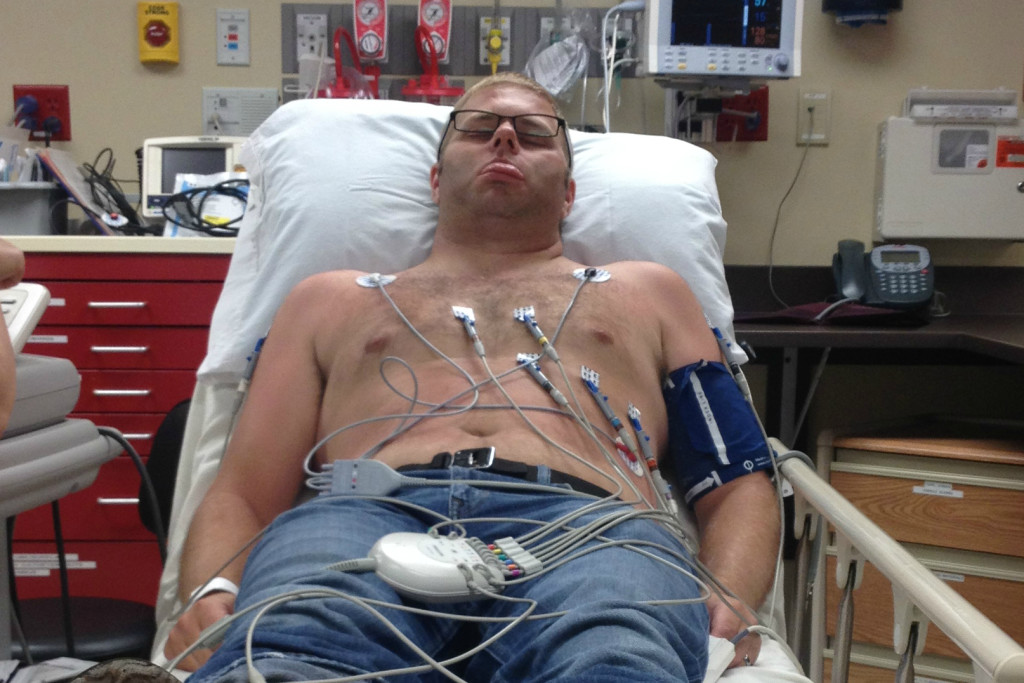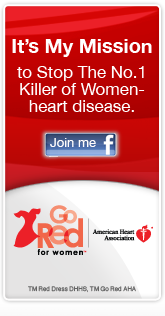Another guest post by my brother, Mike Thorson, about an experience so many survivors have — people asking us about symptoms, telling us their fears, wanting us to describe our symptoms differently than what they are feeling so that they can stop worrying and get back to their lives.
Our responses, though, are always the same: Get your ass to the hospital. Now. The best thing that can happen is that you’ll be embarrassed. Trust us. — Jen
 I wanted to share a quick story about a conversation I had with a friend of mine today. I think that it’s one that we all need to hear because the lesson is so simple yet so important: When in doubt, get your ass to the hospital.
I wanted to share a quick story about a conversation I had with a friend of mine today. I think that it’s one that we all need to hear because the lesson is so simple yet so important: When in doubt, get your ass to the hospital.
So after church today while everyone was milling about, a friend of mine walks on over and says:
“Hey, Mike. I wanted to ask you about your heart attack.”
Me: “Ok, sure. What do you want to know?”
“Well, tell me about your symptoms.”
Me: “Go to the hospital.”
“No, like really, what did it feel like.”
“Go to the hospital.”
“Well, I don’t want to go in if its nothing.”
“In my experience, which is why you are asking me in the first place, it is better to look dumb in the ER than to look dead at home. You need to go see a doctor and you need to see them today. Like now. I ignored my symptoms for days and it nearly killed me. For real. So get your ass to the hospital.”
“Ok.”
“Ok, good. I will follow up with you later today.”
I did check up on him and he did go to the Urgent Care center. Turns out his heart is fine, his chest pains were from excessive coughing because he has bronchitis. He was discharged with a prescription and all will be well — and he can sleep tonight knowing the pains in his chest are not going to kill him.
A bonus about chest pains is speedy service. My friend texted me this from the clinic:
“Apparently if you say you are worried about your heart, you get moved to the front of the line.”
Totally, which is sweet, but also helps make my point: heart attacks and heart disease is some serious shit. You can ignore lots of other types of ailments and they will get progressively worse and inconvenient until you finally go in to see the doctor. Ignore your heart pains for too long and they will just up and kill you. (And to all my “I have low cholesterol and no family history” friends out there, never forget that 50 percent of heart attacks happen to people without high cholesterol or previous heart disease histories.)
We all struggle with trying to make the right choice when it comes to our health, especially when it involves going to a doctor or an ER. I know this better than most. The constant battle to be vigilant and aware of what is going on with my body is the great unseen side effect of heart disease. Heart attacks can cause symptoms in your arms, neck, back, chest, stomach, hands, and fingers. It can show up as shortness of breath, fatigue, acid reflux, and hot flashes, to name a few. So basically if anything is off with your body from the waist up, it could be early symptoms of a heart attack.
My friend’s reaction is common: we all don’t want to look dumb if it turns out to be nothing. I know that feeling well. I have been to see the the doctor many times and made a couple of ER trips in the two years since my heart attack with symptoms I thought might be heart-related. Each time it came up no. And each time I slept better because of it; so did my wife.
The picture above it from my most recent visit to the ER this summer. We were on vacation with my sisters in northern Minnesota. I was having trouble getting to sleep and had some mild chest pains, as well as some shortness of breath. (Chest pain and shortness of breath with lying down doing nothing is not normally good.)
As I lay there I have the same conversation with myself as I have had many times (and without a doubt many of you have had before too). It’s the conversation my friend surely had in his head before he came and talked to me. We try to decipher if what we are feeling is a temporary mild issue that will resolve itself or is it something more. Do I want to worry and inconvenience my family by going to the ER?
After arguing with myself I finally decided that any inconvenience of a trip (20-mile trip have you) to the ER would be far outweighed by the inconvenience of me dying on our vacation (seriously this is what was going on in my head). So at 12:30 a.m. I woke my sister to ask her to watch my kids and to not worry about me but I was going to town because I was having chest pains. Beth and I spent a super romantic night at the Park Rapids ER. Got a bunch of tests done and the result is: too much water-skiing.
Yup, my heart was fine but the diagnosis was that I had overdone it the last few days by water skiing, causing chest wall pain.
I like to laugh about it now, but the reality is that nobody laughed then. Not one nurse, doctor, wife, or family member. Nobody thought it was dumb or silly or wasteful. Because in reality we all slept better because of it. And in reality we all know that someday, sometime, maybe ten years from now or six months or two weeks or tomorrow I will go to the hospital or the ER and it will save my life. Today might be your day. Maybe it’s nothing, maybe it’s bronchitis, but maybe it isn’t and that trip will save your life.
The takeaway from this story is simple: When in doubt, get your ass to the hospital. But it is often the simple lessons that are the hardest to learn.
Editor’s note: Mike’s timing with this post is perfect. I just read this article today about a study of treatment-delay behaviors. Turns out women in particular display an “optimism bias” if their symptoms improve even a little bit, and they are less likely to seek treatment because it is too disruptive. Been there, done that. You don’t, okay?



Hello Mike (and Jen)! This is SUCH an important message! “It is better to look dumb in the ER than to look dead at home” – I’m going to go embroider that on a pillow!
I now tell women in my heart health presentation audiences to imagine what they’d do if the symptoms they’re feeling were happening to somebody else: their daughter, or their sister, or their mother, or anybody else they cared about. Would we tell those other people to just ‘go back to sleep’ or ‘wait a few hours to see if things get better’? No way! We’d all be screaming blue murder and demanding immediate emergency care. We all need to be just as committed to getting that immediate care for ourselves as we would for others.
Mayo Clinic cardiologists have a good rule to keep in mind whenever we’re trying to talk ourselves out of going to the ER: “Don’t be embarrassed to death!”
PS: Jen, I interviewed Dr. Catherine Kreatsoulous (the researcher quoted in that “optimism bias” article you found) a couple of months ago about her presentation at the Canadian Cardiovascular Congress in Vancouver. She and her team at Harvard developed the term “symptomatic tipping point” to describe that period of time between the onset of cardiac symptoms and the decision to finally seek care. Turns out that there’s been a ton of research besides Dr. K’s study on this strange phenomenon of “treatment-seeking delay behaviour” – for example: http://myheartsisters.org/2014/11/30/downplaying-heart-attack-symptoms/
Happy (and Healthy!) New Year to both of you!
regards,
C.
Hi Carolyn!
I exhibited nearly all of those as well! This one is all me: “knowing and going on the patient’s own terms (women wanted to remain in control, were not willing to let others make decisions for them, and openly acknowledged that they did not like to ask others for help – these are the women who drive themselves to emergency!)”
And this entire list!:
downplaying and neglecting cardiac symptoms;
symptoms seen as intrusions in their daily lives;
women defending themselves against this intrusion to remain in control and to maintain social responsibilities;
as their symptoms evolved into constant chest pain, the women began to realize the seriousness of their symptoms;
when pain became unbearable, they finally took the decision to seek medical care
(Or in my case, about 12 hours after the pain became unbearable. Crazy!)
Thanks for helping share this post so as many as possible can see it!
Jen